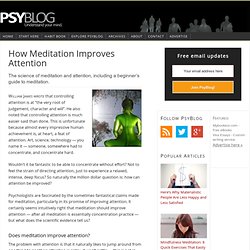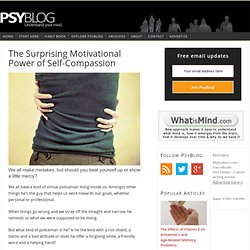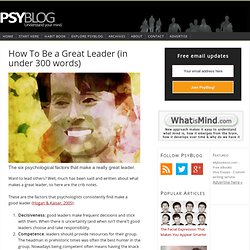

What The Eyes Reveal: 10 Messages My Pupils are Sending You. The dilation and constriction of the pupils reveals how hard we’re thinking, how excited or disgusted we are and more… Our pupils, the black holes which let light into the eyes, don’t just help us see, they also signal what’s going on in our minds.

Here are 10 pieces of psychological research which show how changes in pupil size reveal many aspects of thought. 1. I’m thinking hard Look into my eyes and ask me to name the cigar-smoking founder of psychoanalysis and you won’t see much change in my pupil size. But ask me to explain the laws of cricket and watch my pupils expand. That’s because research has shown that the harder your brain works, the more your pupils dilate. Cognitive Dissonance. Understanding this experiment sheds a brilliant light on the dark world of our inner motivations.

The ground-breaking social psychological experiment of Festinger and Carlsmith (1959) provides a central insight into the stories we tell ourselves about why we think and behave the way we do. The experiment is filled with ingenious deception so the best way to understand it is to imagine you are taking part. So sit back, relax and travel back. The time is 1959 and you are an undergraduate student at Stanford University… As part of your course you agree to take part in an experiment on ‘measures of performance’. Little do you know, the experiment will actually become a classic in social psychology.
The set-up Once in the lab you are told the experiment is about how your expectations affect the actual experience of a task. Perhaps you wonder why you’re being told all this, but nevertheless it makes it seem a bit more exciting now that you know some of the mechanics behind the experiment. Why Thought Suppression is Counter-Productive. How pushing a thought out of consciousness can bring it back with a vengeance. It sometimes feels like our minds are not on the same team as us. I want to go to sleep, but it wants to keep me awake rerunning events from my childhood. I want to forget the lyrics from that stupid 80s pop song but it wants to repeat them over and over again ad nauseam. This internal battle can be anything from the attempt to suppress an occasional minor irritation (did I turn off the cooker?)
To a near-constant obstacle to everyday life. The classic response to this mental wrangling — whether relatively trivial or deadly serious — is to try and forget about it, push it to the back of our minds or some other variation on the theme. Thought rebound In the study that kicked off research in this area Professor Daniel Wegner and colleagues investigated the effects of thought suppression (Wegner et al., 1987). Suppressing emotions. How Meditation Improves Attention. The science of meditation and attention, including a beginner’s guide to meditation.

William James wrote that controlling attention is at “the very root of judgement, character and will”. He also noted that controlling attention is much easier said than done. This is unfortunate because almost every impressive human achievement is, at heart, a feat of attention. Art, science, technology — you name it — someone, somewhere had to concentrate, and concentrate hard. Wouldn’t it be fantastic to be able to concentrate without effort? Psychologists are fascinated by the sometimes fantastical claims made for meditation, particularly in its promise of improving attention. Does meditation improve attention? The problem with attention is that it naturally likes to jump around from one thing to another: attention is antsy, it won’t settle — this is not in itself a bad thing, just the way it is. Quicker results Dr. The Surprising Motivational Power of Self-Compassion. We all make mistakes, but should you beat yourself up or show a little mercy?

We all have a kind of virtual policeman living inside us. Amongst other things he’s the guy that helps us work towards our goals, whether personal or professional. When things go wrong and we stray off the straight and narrow, he reminds us what we were supposed to be doing. But what kind of policeman is he? Is he the kind with a riot shield, a baton and a bad attitude or does he offer a forgiving smile, a friendly word and a helping hand? People sometimes think of the latter, more relaxed internal policeman, as being weak and ineffectual. So, what stance should we adopt towards ourselves? Let’s say someone is trying to deal with a recent period of low self-confidence. When psychological researchers tested these approaches they found that self-compassion was surprisingly powerful (Breines & Chen, 2012). So self-compassion did not emerge as the soft-option: in fact, quite the opposite. Image credit: Loving Earth. How To Be a Great Leader (in under 300 words) The six psychological factors that make a really great leader.

Want to lead others? Well, much has been said and written about what makes a great leader, so here are the crib notes. These are the factors that psychologists consistently find make a good leader (Hogan & Kaiser, 2005): Decisiveness: good leaders make frequent decisions and stick with them.